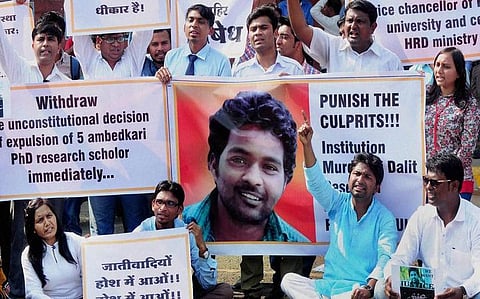
Bengaluru- United Nations human rights experts have raised significant concerns about Karnataka's draft Rohith Vemula (Prevention of Exclusion or Injustice) Bill, while acknowledging its intent to combat caste-based discrimination in educational institutions. The special rapporteurs - Ashwini K.P. on contemporary forms of racism and Nicolas Levrat on minority issues - issued a detailed statement offering recommendations to strengthen the proposed legislation.
Named after the Dalit scholar whose suicide sparked nationwide protests, the bill seeks to penalize discrimination against students from SC, ST, OBC and minority communities with punishments including one-year imprisonment or ₹10,000 fines for offenders, and potential withdrawal of government funding from violating institutions.
The UN experts noted several critical gaps in the current draft. While appreciating its objectives, they highlighted the absence of clear legal definitions for "direct or indirect discrimination," which could lead to inconsistent implementation.
A major concern is the bill's failure to specifically address the unique systemic barriers faced by Dalit and Adivasi students, despite grouping them with OBCs and religious minorities. Ashwini K.P. emphasized that while all these communities face marginalization, the particularly severe and persistent nature of caste-based discrimination against SC/ST students requires explicit recognition in the legislation. The rapporteurs also cautioned that an overemphasis on punitive measures might prove counterproductive without complementary preventive approaches.
Their recommendations propose substantial revisions to make the law more effective. They advocate incorporating comprehensive anti-discrimination definitions to prevent misuse while ensuring robust protections. The experts stress the importance of adding preventive mechanisms like mandatory sensitivity training and awareness campaigns in educational institutions.
To ensure proper implementation, they suggest establishing independent grievance redressal systems with whistleblower safeguards and instituting accountability measures for non-compliant colleges. The drafting process itself came under scrutiny, with the rapporteurs noting insufficient consultation with affected communities and calling for more inclusive participation, including proportional representation of Karnataka's caste, gender and regional diversity in the drafting committee.
The political context surrounding the bill adds another layer of complexity. The legislation originates from Congress's 2024 election manifesto promise, with Rahul Gandhi personally urging party-ruled states to enact such laws. Karnataka Chief Minister Siddaramaiah initiated the drafting process after this push, with Social Welfare Minister Priyank Kharge contributing inputs.
However, the UN experts noted the Indian government hasn't sought international guidance on the bill. While opposition BJP leader Chalavadi Narayanaswamy agrees in principle with prohibiting caste discrimination, he questions whether legislation alone can address these deep-rooted social issues, reflecting ongoing political debates about the bill's potential effectiveness.
The rapporteurs' intervention highlighgts the global significance of addressing caste-based discrimination in education while highlighting the challenges in crafting meaningful legislation. Their recommendations aim to transform the bill from a symbolic gesture into an instrument of real social change by addressing structural inequalities and ensuring practical enforcement mechanisms.
As Karnataka moves forward with this legislation intended to honor Rohith Vemula's memory, the UN input provides crucial guidance for creating a law that genuinely protects vulnerable students and fosters more inclusive academic environments. The state government now faces the task of balancing domestic political considerations with these international human rights perspectives to develop legislation that effectively combats educational discrimination.
This story has been prepared based on a report originally published by The Wire. For the complete original coverage, you can read their detailed report here.
You can also join our WhatsApp group to get premium and selected news of The Mooknayak on WhatsApp. Click here to join the WhatsApp group.